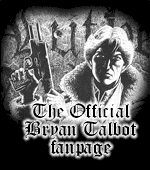 |
 |
 |
 |
 |
 |
 |
 |
 |
Bryan's advice to new Comic Creators
As you can imagine, I receive a great deal of requests for information, criticism and even job applications! Sometimes these number up to a dozen every week. You'll be well aware of the time consuming nature of artwork production. This, combined with the fact that I'm usually working to strict deadlines, means that I don't have the time to answer these requests in any detail.
What I always suggest to people wanting to get work in the field of comicbook illustration or writing is to join The Comic Creators' Guild of Great Britain (CCG). It is a good starting point. It costs about £40 a year, has monthly meetings in London and a monthly newsletter, often containing news of editors looking for contributors etc. For details see The Comic Creators' Guild: www.comicscreatorsguild.co.uk
They also publish booklets on artwork submission guidelines etc that are available to non-members.
In order to work in the comic business you need to keep up to date with the state of the industry and be known by the other people working in it. The monthly newspaper Comics International is the easiest way to keep up with the publishing news and is available from any comicbook store. The classified ad section is also good for putting up-and-coming writers and artists in touch with each other.
If you are starting from scratch, you need to go into your local magazine shop or comicbook emporium and look through the publications, noting the titles, addresses and, if possible, the names of the editors of those which you think would suit your style/s. Send your samples to the editor with a brief note and a stamped, self-addressed envelope.
Comic conventions are the best way to meet publishers / editors / creators in person. Depending on the size of the convention, sometimes there are publishers' booths at which you can present your portfolio of work or story proposals.
Separate from the mainstream publishers, there is a thriving Small Press in Britain which ranges from tiny independent publishers with print runs of a few thousand to photocopied comics, self-published by the artists themselves and limited to a few hundred copies. Their subject matter is as diverse as their creators' tastes. A note with SAE to the CCG will put you in touch with this market if you are attracted by the idea. It's biggest advantage is that you keep all the profit from any sales and total control of all rights on your creations. There is also a small press convention every year in Oxford called Caption.
As with any other vocation, you need to be conversant with
the medium. This entails reading all types of comicbooks and becoming
familiar with the visual grammar, the ways used by comics to tell stories.
I strongly recommend Comics
and Sequential Art
by Will Eisner and Understanding
Comics
by Scott McCloud, the latter actually an excellent comicbook in its own
right.
To artists, of whatever ability, I can't stress too strongly
the importance of Life Drawing classes. These will help your drawing,
no matter what style you work in. I do them myself whenever I can. Another
book I can recommend is Figure
Drawing Without a Model
by Ron Tiner. This is especially good for comic artists as Ron is one
himself and there are a few chapters on drawing for comicbooks that contain
particularly good advice.
I hope that this is of some use to you.
The best of luck,

Bryan Talbot
P.S. All books mentioned on this page are available from Amazon right now!